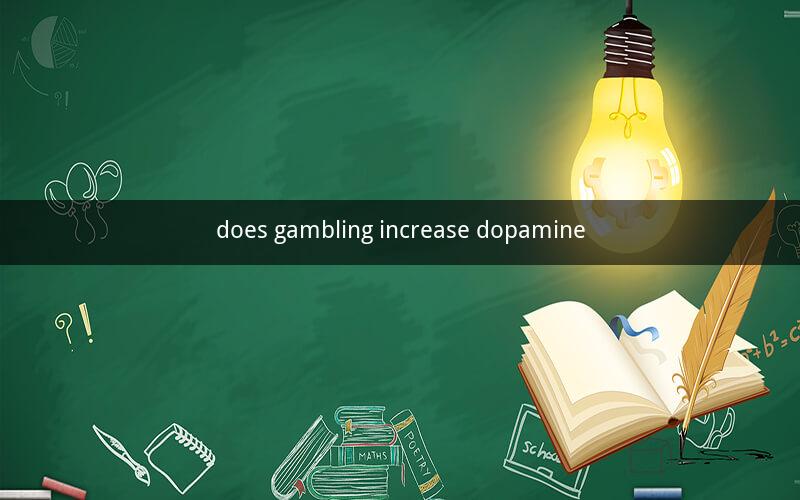
Table of Contents
1. Understanding Dopamine
2. The Role of Dopamine in Reward and Pleasure
3. The Dopamine Response to Gambling
4. The Link Between Gambling and Dopamine Levels
5. Factors Influencing Dopamine Release During Gambling
6. The Impact of Dopamine on Gambling Behavior
7. Dopamine and Problem Gambling
8. The Role of Dopamine in Recovery from Problem Gambling
9. Dopamine and the Future of Gambling Research
10. Conclusion
1. Understanding Dopamine
Dopamine, a neurotransmitter in the brain, plays a crucial role in various cognitive functions, including motivation, reward, and pleasure. It is often referred to as the "feel-good" chemical, as it is released when we engage in activities that are rewarding or pleasurable.
2. The Role of Dopamine in Reward and Pleasure
Dopamine is released when we experience rewards, such as winning a prize or achieving a goal. This release of dopamine creates a feeling of pleasure and reinforces the behavior that led to the reward. This mechanism is essential for survival, as it encourages us to repeat behaviors that are beneficial to our well-being.
3. The Dopamine Response to Gambling
Gambling is an activity that can trigger the release of dopamine in the brain. When a person wins a bet, the brain releases dopamine, creating a pleasurable sensation. This sensation reinforces the behavior of gambling, making it more likely for the individual to continue engaging in the activity.
4. The Link Between Gambling and Dopamine Levels
Research has shown that individuals who engage in gambling have higher dopamine levels than those who do not. This link suggests that gambling may be an effective way to stimulate the release of dopamine, leading to increased pleasure and reinforcement of the behavior.
5. Factors Influencing Dopamine Release During Gambling
Several factors can influence the release of dopamine during gambling. These include the amount of money won, the chance of winning, and the frequency of winning. Additionally, individual differences, such as personality traits and genetic predispositions, may also play a role in the dopamine response to gambling.
6. The Impact of Dopamine on Gambling Behavior
The release of dopamine during gambling can have a significant impact on gambling behavior. It can lead to increased impulsivity, risk-taking, and a desire to continue gambling in the hope of experiencing the same pleasurable sensations. This can lead to problem gambling and addiction.
7. Dopamine and Problem Gambling
Problem gambling is a condition characterized by an inability to control gambling behavior, despite negative consequences. The release of dopamine during gambling may contribute to the development of problem gambling, as the pleasurable sensations associated with winning can become addictive.
8. The Role of Dopamine in Recovery from Problem Gambling
Understanding the role of dopamine in problem gambling can help in developing effective treatment strategies. By addressing the dopamine-driven aspects of gambling behavior, individuals can learn to control their gambling and reduce the risk of relapse.
9. Dopamine and the Future of Gambling Research
Further research on the role of dopamine in gambling can help us better understand the mechanisms behind problem gambling and addiction. This knowledge can lead to the development of more effective prevention and treatment strategies.
10. Conclusion
The relationship between gambling and dopamine is a complex one. While dopamine release can create a pleasurable sensation and reinforce gambling behavior, it can also contribute to problem gambling and addiction. Understanding this relationship can help us develop effective strategies to address the challenges associated with gambling.
Questions and Answers
1. What is dopamine?
- Dopamine is a neurotransmitter in the brain that plays a crucial role in various cognitive functions, including motivation, reward, and pleasure.
2. How does dopamine contribute to reward and pleasure?
- Dopamine is released when we experience rewards, creating a feeling of pleasure and reinforcing the behavior that led to the reward.
3. What is the link between gambling and dopamine levels?
- Research has shown that individuals who engage in gambling have higher dopamine levels than those who do not, suggesting that gambling may be an effective way to stimulate the release of dopamine.
4. What factors influence dopamine release during gambling?
- Factors such as the amount of money won, the chance of winning, and individual differences can influence dopamine release during gambling.
5. How does dopamine impact gambling behavior?
- Dopamine release can lead to increased impulsivity, risk-taking, and a desire to continue gambling, potentially contributing to problem gambling and addiction.
6. What is problem gambling?
- Problem gambling is a condition characterized by an inability to control gambling behavior, despite negative consequences.
7. How can understanding dopamine help in treating problem gambling?
- Understanding the dopamine-driven aspects of gambling behavior can help in developing effective treatment strategies to address the underlying causes of problem gambling.
8. What is the role of dopamine in recovery from problem gambling?
- Addressing the dopamine-driven aspects of gambling behavior can help individuals learn to control their gambling and reduce the risk of relapse.
9. How can research on dopamine contribute to the future of gambling research?
- Research on the role of dopamine in gambling can help us better understand the mechanisms behind problem gambling and addiction, leading to the development of more effective prevention and treatment strategies.
10. What are some potential treatment strategies for problem gambling?
- Potential treatment strategies for problem gambling include cognitive-behavioral therapy, medication, and support groups. These strategies aim to address the underlying causes of problem gambling and reduce the risk of relapse.